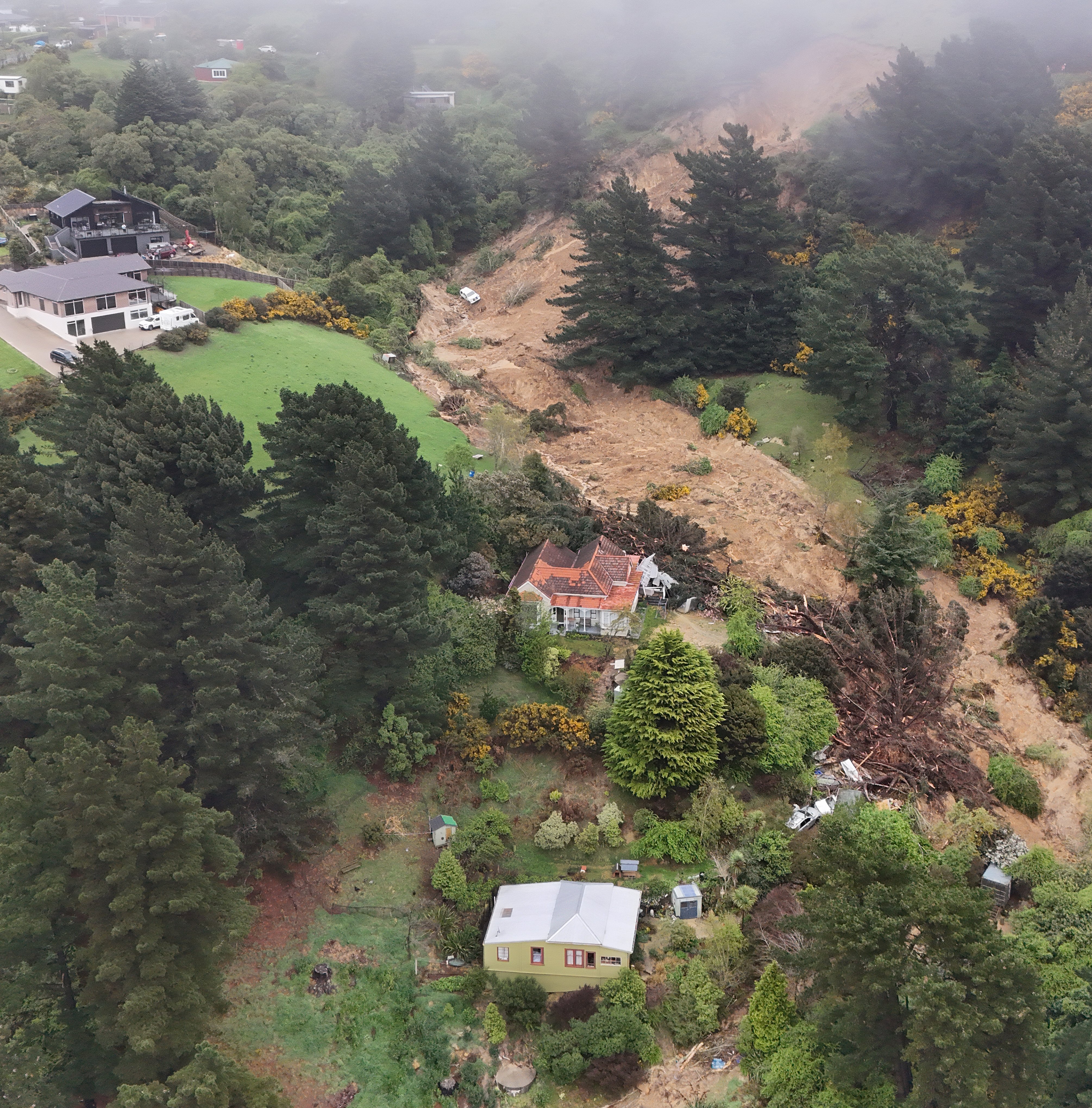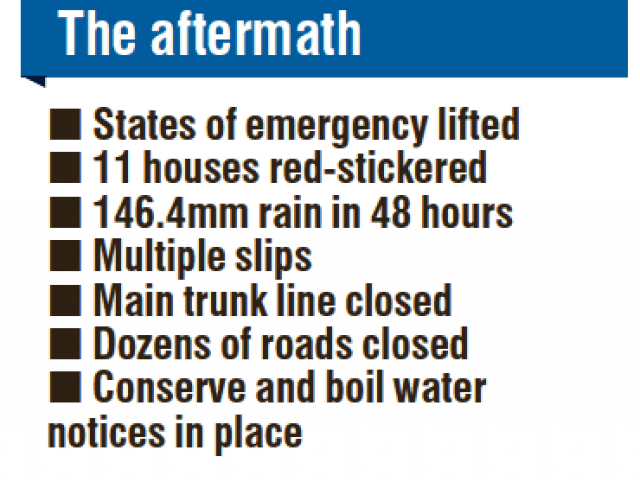
The Prime Minister will arrive in Dunedin at 9am today and address media about the flood recovery at 12.30pm.

On two consecutive days Dunedin received more rain than usually falls on the city in the month of October.
Infrastructure was overwhelmed and the ground saturated.
Slips in Maia, Tainui and across the city closed roads, damaged Three Waters infrastructure and put people in harm’s way.
The Dunedin City Council red-stickered 11 properties after 44 inspections.
About 20 roads remained closed in Dunedin as did about a dozen in the Clutha district last night.
Boil water notices and conserve water notices were in effect in some areas and officials warned the public to stay out of floodwater contaminated areas, including city beaches, or risk illness or infections.
NZ Transport Agency Waka Kotahi (NZTA) this morning advised motorists to expect delays when using SH88 in Dunedin as contractors investigated the extent of the damage.
An NZTA spokesman said there would be delays of up to 30min between 9am and 4pm for the next three days on SH88 at the Parry St rockfall site while contractors did scaling works to make the road safe.
Investigations to assess damage were under way at the Burkes slip on SH88. The road was currently under traffic light stop/go traffic management.
Other geotechnical investigations were continuing at various sites on SH88, he said.
Dunedin Mayor Jules Radich yesterday thanked city residents for their calm in the face of the storm.
"People have helped themselves and then they’ve helped their friends, neighbours, relatives - they’ve helped themselves and then they’ve helped others", Mr Radich said.
"It’s just outstanding, an outstanding community response.
"I also want to thank our [council] staff, contractors, first responders and volunteers who have gone above and beyond - in many cases working through the night in terrible weather - to help our community."
Mr Radich said all of the properties that were red-stickered were related to slips and not flooding. He could not offer a timeframe for the city’s recovery, nor an estimate of damages. He lifted the state of emergency at 4pm yesterday.
The welfare centre at Forsyth Barr Stadium also closed.
A massive slip at Maia knocked out about 500m of water main that serves the West Harbour suburbs.
Mr Radich called it the biggest single challenge immediately facing the city as it recovered.
A council spokesman said staff were now working at speed to install a temporary pipeline, but he could not yet say when it would be ready for use.
Civil Defence controller Rob West said council staff and contractors were working to reopen roads, clear slip debris, reinstate water supplies on the West Harbour and Otago Peninsula and help members of the community who needed aid.
West Harbour from Ravensbourne to Deborah Bay was subject to a precautionary boil water notice, Mr West said.
This included Maia, Roseneath, Sawyer’s Bay, Port Chalmers, Carey’s Bay and Deborah Bay - but not St Leonards, which was supplied by a different reservoir.
As an interim measure water was being supplied to those areas from a reservoir at Port Chalmers.
Water trucks offering clean drinking water remained at Roseneath, Sawyer’s Bay and Port Chalmers.
All West Harbour residents, including those in St Leonards, were asked to conserve water, as were residents on Otago Peninsula, from Rotary Park to Portobello, he said.
Level 1 water restrictions were in place for Outram and Waikouaiti, including Karitane and Hawksbury, he said.
Many road closures remained in place around the city. State Highway 88 to Port Chalmers has reopened this morning, with single-lane sections and speed limits around slip areas.
Clutha’s state of emergency was lifted at noon yesterday.
A statement from the Clutha District Council said it had been put in place on Friday when State Highway 1 closed north of Milton, isolating the district.
It was lifted after the highway reopened.
Kiwirail South Island infrastructure manager Gary Ikin said there had been many slips along the 340km Main South Line (MSL) between Timaru and Invercargill, which had been closed on Thursday.
Track inspections on Saturday led to the reopening of the northern- and southern-most section of the track, but it remained closed between Oamaru and Clinton yesterday.
Some slips were relatively minor "but others are significant - with material blocking the tracks or falling away below the rail line".
"There are also some small slips which we continue to monitor closely, in case they get worse, and places where floodwaters have washed out the tracks.
"The most damaged area appears to be north of Dunedin, around Shag Point, where there are a number of substantial slips above and below the tracks."
Retaining walls and other structures would need to be built where earth below the tracks had fallen away.
There was also a slip on the Port Chalmers Branch Line which was blocking rail access to the port, Mr Ikin said.
South of Dunedin about 7km of track was still underwater due to the Taieri River flooding.
Staff would not be able to properly inspect this track and make repairs until the flood waters have receded.
However, staff and contractors began repair work in many areas on Saturday, he said.
Geo-technical investigations were undertaken around Shag Point and the more substantial repairs had begun.
"We want to reopen the MSL as quickly as we can, to get our customer’s freight moving.
"There is still a lot of work to do over the coming days to make sure the line is safe for freight services to run."
A police spokesman said alongside civil defence and search and rescue teams, police assisted with a number of evacuations overnight Thursday, and assisted with traffic management on flood-affected roads.
Police also carried out reassurance and prevention patrols across the area over the course of the weekend, keeping an eye on properties, assisting the community and responding to calls for service, he said.
MetService meteorologist Alwyn Bakker said Dunedin got 76mm of rain on Thursday and on Friday got 70.4mm.
The city’s average for the month of October was 69.3mm of rain, he said.
Rather than any flash flooding there had been a "constant stream of moisture" over the coastal Otago area.
"It was partly the fact that it just kept on going and going and going and going with no real let up", he said.












